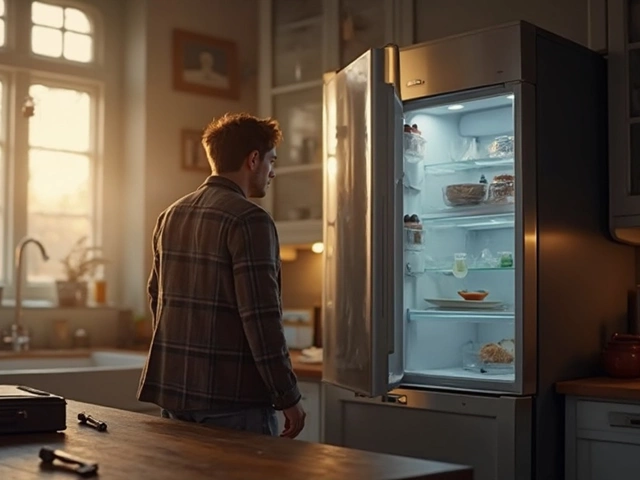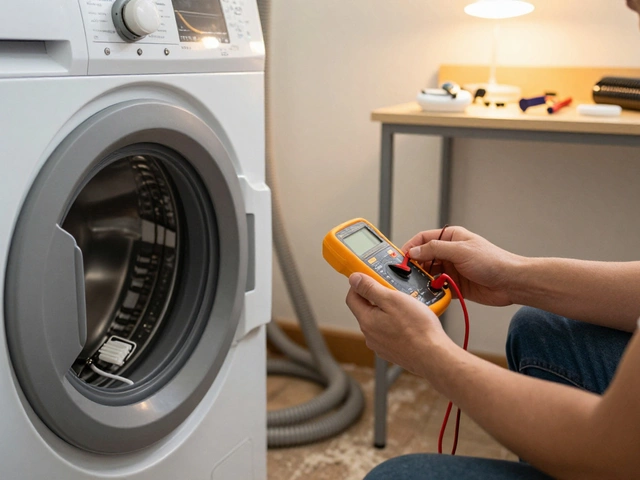If your freezer has stopped cooling or is making weird noises, the compressor is often the culprit. The compressor is the heart of the cooling system – it pumps refrigerant around so the freezer stays frosty. When it fails, you’ll notice a warm freezer, loud humming, or the unit just won’t run at all. Knowing the basics can save you time, money, and a lot of frustration.
First, listen. A healthy compressor hums steadily, like a refrigerator. If you hear clicking, clanking, or a high‑pitched squeal, something’s off. Next, feel the temperature. Place your hand on the freezer wall; if it’s warm or only a few degrees above room temperature, the compressor probably isn’t moving refrigerant.
Another clue is the start‑up cycle. When you plug the freezer back in, a good compressor will kick on within a few seconds. If it tries to start and then shuts off repeatedly, the start relay or the compressor itself may be failing.
Finally, check for frost build‑up on the back of the freezer or inside the freezer compartment. Excess frost can mean the compressor isn’t completing the cooling loop, leading to moisture freezing where it shouldn’t.
Before you call a technician, try a few simple steps. Unplug the freezer for five minutes, then plug it back in. This power reset can clear minor electronic glitches that stop the compressor from starting.
If the freezer still won’t cool, locate the condenser coils (usually behind or beneath the unit) and clean any dust or debris. Dirty coils force the compressor to work harder and can cause it to overheat.
Next, inspect the start relay – a small black box attached to the compressor. A quick visual check for burnt marks or a cracked case can tell you if it’s dead. If you have a multimeter, you can test the relay’s continuity; a reading of zero means it’s busted and needs replacement.
When these DIY steps don’t bring the freezer back to life, it’s time to bring in a professional. Replacing a compressor isn’t a simple plug‑and‑play job – it involves evacuating refrigerant, handling sealed system components, and ensuring the new compressor matches the original specs. A certified appliance repair technician has the tools and knowledge to do this safely and legally.
Even if you’re handy, avoid attempting a full compressor swap yourself. Mishandling refrigerant can be dangerous and is illegal without proper certification. Instead, schedule a service call, describe the symptoms you’ve observed, and let the expert confirm the problem.
Regular maintenance can keep the compressor healthy for years. Clean the coils every six months, keep the freezer away from direct sunlight, and defrost excess ice promptly. Also, ensure the freezer has enough clearance around it for proper airflow – a cramped unit forces the compressor to run longer and wear out faster.
In short, watch for noisy or warm operation, try a power reset and coil cleaning, and check the start relay. If those fixes don’t work, call a qualified repair service to replace the compressor safely. With a little attention, your freezer will stay cold and reliable, and you’ll avoid costly replacements down the line.

A malfunctioning freezer can be a headache, particularly when it involves the compressor. Understanding whether it's worthwhile to replace a compressor requires consideration of several factors, including cost, age, and efficiency. This article breaks down the key elements for deciding if compressor replacement is the best route. With practical advice and insider tips, you'll gain clarity on making an informed decision for your appliance.

If your freezer isn't doing its one job—keeping things cold—you're in a pickle. But before you start shopping for a new one, there are a few things you might try to get it back to work. From checking the power source to cleaning coils, fixing cooling problems can often be simple and straightforward. Let's explore some potential solutions to get your freezer chilling again.

Cracks in electric hobs can show up suddenly and cause real headaches in the kitchen. This article looks at why electric hobs crack, from common mistakes to sneaky issues with installation. You'll get practical tips on how to prevent damage and handle minor cracks. Find out when you can fix a hob yourself and when it's smarter to call for professional help. Stay ahead of costly repairs and keep your cooking space safe.

Learn how to fix common dryer problems yourself-no experience needed. Save money and avoid service calls with simple repairs like replacing belts, fuses, and cleaning vents.

Repairing an electric oven on your own can be daunting, but it may be easier than it seems. This article explores the basics of oven function, safety tips, and common issues like heating problems or broken knobs. You'll find valuable advice on identifying problems and learning when it's best to call a professional. With a bit of knowledge, some troubleshooting, and a few tools, you might be able to save money on repair costs. Remember to prioritize safety above all while attempting repairs.

Electric ovens are handy, but they're not immune to problems. This article breaks down the most common faults people face, from ovens not heating properly to strange noises and error codes. You’ll get real tips on troubleshooting and signs when it’s time to call in the pros. Save time (and maybe some frustration) by knowing what to look out for. Find out why your oven might let you down and how to deal with it.